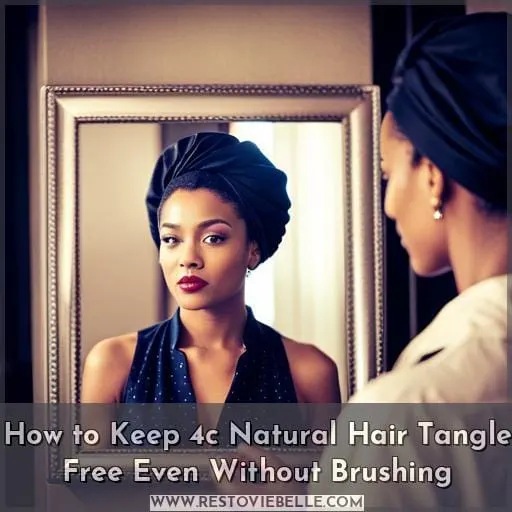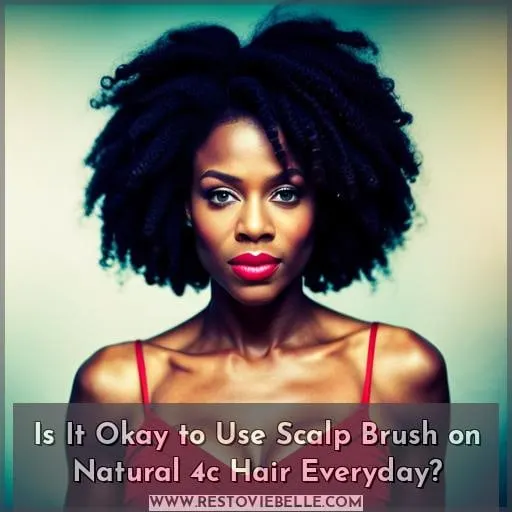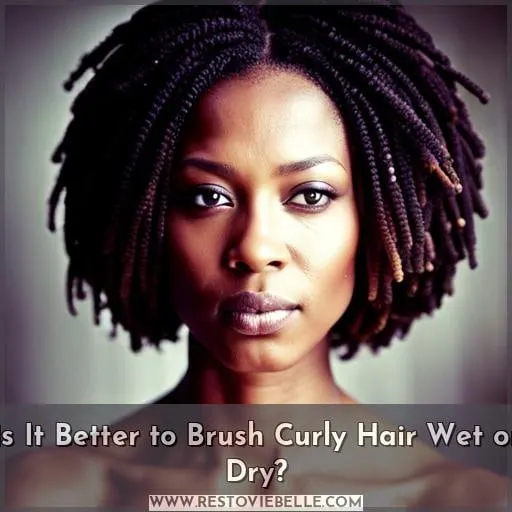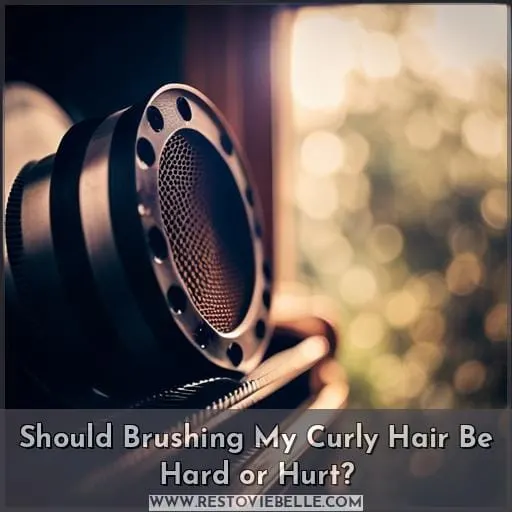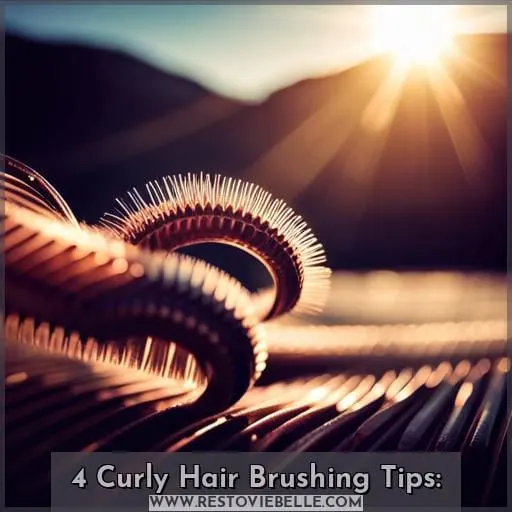This site is supported by our readers. We may earn a commission, at no cost to you, if you purchase through links.
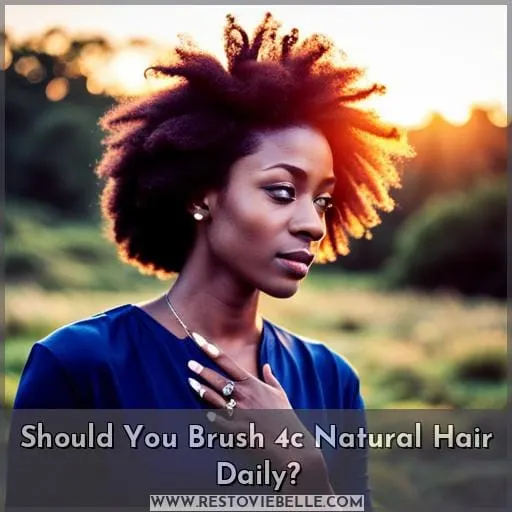 Confused about whether or not to brush 4c natural hair everyday? You’re not alone. With so much conflicting advice available, it can be hard to know what’s best for your unique hair type and texture. To help you understand the impacts of brushing – as well as alternatives that could help keep your curls healthy and tangle-free – we’ll cover all the important information in this article.
Confused about whether or not to brush 4c natural hair everyday? You’re not alone. With so much conflicting advice available, it can be hard to know what’s best for your unique hair type and texture. To help you understand the impacts of brushing – as well as alternatives that could help keep your curls healthy and tangle-free – we’ll cover all the important information in this article.
From benefits of avoiding combing altogether, factors that influence how often you should brush 4c natural hair, detangling techniques without a brush, scalp brushes specifically designed for curly textures and more! Read on for everything you need to know about maintaining beautiful 4c curls with minimal damage.
Table Of Contents
- Key Takeaways
- Benefits of Not Combing Natural Hair
- How Often Should You Comb 4c Hair?
- How to Keep 4c Natural Hair Tangle Free Even Without Brushing
- Is It Okay to Use Scalp Brush on Natural 4c Hair Everyday?
- Top 3 Recommended Products for 4c Hair:
- Does Combing Hair Ruin Curls?
- Is It Better to Brush Curly Hair Wet or Dry?
- Should Brushing My Curly Hair Be Hard or Hurt?
- What is the Best Brush for Curly Hair?
- 4 Curly Hair Brushing Tips:
- Conclusion
Key Takeaways
Conflicting advice on brushing 4C natural hair.
Impact of brushing on hair health.
Benefits of avoiding excessive combing for 4C hair.
Factors to consider for combing 4C hair.
Benefits of Not Combing Natural Hair
For 4c natural hair, combing should be minimized to avoid breakage and loss of protein, retain moisture for less frizziness, and promote healthy hair growth. A gentle approach is essential for keeping the scalp healthy while tailoring a personalized routine that takes into consideration individual needs such as texture and goals.
With these tips in mind, you can keep your 4c natural hair tangle-free without excessive brushing or combing.
Minimizing Breakage and Protein Loss
By tailoring your hair care routine to the needs of your individual 4c texture and avoiding excessive brushing, you can help preserve natural oils and keep protein loss at bay. Finger combing or using a wide-tooth comb is ideal for detangling while maintaining moisture balance.
Protective hairstyles like braids, twists, or buns also minimize breakage from frequent styling. Try different products such as conditioners and leave-in treatments before brushing for smoother results.
Regular scalp massages with an appropriate brush can improve blood circulation to promote healthy growth with minimal damage risk when done correctly.
Retaining Moisture and Reducing Frizz
You can help keep your 4c natural hair hydrated and frizz-free by avoiding excessive combing. To retain moisture, opt for protective hairstyles that minimize detangling. Consider nighttime care, such as a satin bonnet or pillowcase, to reduce friction while you sleep.
Finger comb when necessary, but use conditioner or leave-in product to reduce breakage and add curl definition.
Promoting Hair Growth and Scalp Health
For a healthy scalp and maximum hair growth, treat your 4c locks with gentle care by using protective hairstyles that minimize detangling. Incorporate nighttime care, such as wearing a satin bonnet or pillowcase, to lock in moisture and reduce breakage.
Moisturizing techniques, like deep conditioning, are also beneficial for softening strands and providing nourishment to the scalp.
Protective styling can help keep tight coils tangle-free while minimizing frizz and promoting length retention from root to tip.
Benefits:
- Scalp massage benefits
- Use scalp brush on natural 4c hair
Tips & Techniques:
- Nighttime Care:
- Wear satin bonnet or pillowcase
- Hair moisture retention & natural shine
- Keep 4c tangle-free without brushing
Promoting Hair Growth & Scalp Health:
- Start combing from the ends and work up
- Use a wide tooth comb with no rough edges
- Denman Brush is popular in the community
- Fine Tooth Comb with leave-in conditioner for softer curls
How Often Should You Comb 4c Hair?
When it comes to caring for 4c hair, the question of how often you should comb can be confounding. With factors such as hair type, texture, and goals to consider, finding the right frequency is essential for healthy growth.
Customizing your routine based on individual needs is key in order to get the most out of your natural tresses without causing damage or disruption from daily brushing.
Factors to Consider
When considering whether to brush your 4c hair on a daily basis, it’s important to take into account factors such as curl pattern, the fragility of the strands, and the desired hairstyle. Finger detangling is often recommended over brushing because it is gentle and effective in reducing breakage.
Protective styles can also help minimize tangling, while avoiding excessive brushing or combing can increase moisture retention. It’s important to use alternatives like scalp brushes cautiously on delicate 4c hair, using slow strokes for maximum benefit without causing damage.
Customizing your routine based on your individual needs is key for healthy growth.
Recommended Frequency
To keep your 4c hair looking and feeling its best, it’s important to find an appropriate combing frequency that works for you. For optimum results, detangling should be done prior to combing with a wide-tooth comb or soft-bristle brush.
Finger detangling can also help reduce breakage while protecting the coils from damage caused by brushing too often.
Protective hairstyles such as braids are great options for minimizing daily detangling needs without sacrificing style. Moisturization methods using oils like castor oil or leave-in conditioners can make a huge difference in retaining moisture between wash days and curbing frizz throughout the week.
Combining these methods with nighttime care, such as silk bonnets or satin pillowcases instead of cotton varieties, can help prevent hair from losing its natural oils overnight.
By following these tips, you can achieve healthy growth without overdoing it on daily brushing.
Customizing Based on Individual Needs
Customizing your hair care routine based on individual needs can help ensure that you’re taking the best possible approach to caring for 4c hair. A personalized approach allows you to tailor a plan of action specifically to meet your unique needs and requirements.
This includes selecting the right brush, moisturizer, products, styles, and frequency of brushing depending on your curl pattern and texture. Taking into consideration factors such as environmental conditions or lifestyle choices will also benefit overall health by preventing damage or breakage with regular styling.
By customizing a curly hair routine based on individual needs, you can find an ideal balance between healthy growth and maintenance while avoiding excessive tension from daily combing routines.
How to Keep 4c Natural Hair Tangle Free Even Without Brushing
Caring for 4c natural hair can be a challenge, especially when it comes to reducing tangles. To keep your curls tangle-free and healthy without brushing, try regularly detangling with fingers or a wide-tooth comb, along with using detangler or conditioner for smoother results.
Additionally, choosing hairstyles that help prevent tangling can also work wonders in keeping your hair looking good and feeling healthy all day long.
Regular Detangling With Fingers or Wide-Tooth Comb
For 4c natural hair, regular detangling with fingers or a wide-tooth comb can help keep the tresses tangle-free and healthy. Using oil for detangling, such as castor or olive oil, will help make it easier to separate knots and tangles without breaking hairs.
Sectioning techniques are also important when finger combing or using a wide tooth comb.
Moisturizing strategies should be implemented prior to any kind of detangling as well in order to reduce friction between strands while separating them out. Protective hairstyles can also be helpful for minimizing how often you have to do this process.
Finger detangling has many benefits, including reducing breakage since it is gentler on curly hair compared to brushes.
Using Detangler or Conditioner for Smoother Detangling
Using a detangler or conditioner can make your detangling process smoother and less time-consuming, with some users noticing up to 50% less breakage after implementing this easy step. Oil-based detanglers are great for hydration while providing slip to help avoid hair damage.
Benefits of finger detangling should not be overlooked as it provides precision and helps maintain curl integrity. For further moisturization, consider using leave-in conditioners which will also soften the strands, making them easier to manage without breaking hairs off at the roots.
Finally, water spray is key when dealing with 4c natural hair so that tangles don’t become unmanageable.
Choosing Hairstyles That Prevent Tangling
Choosing the right hairstyles for your 4c hair type can help reduce tangling and make caring for it easier. Protective styles like braids, twists, or buns are great options to minimize detangling and keep your hair healthy.
Finger detangling techniques with a light conditioner before styling can also be beneficial in preventing knots from forming overnight.
Satin bonnets or pillowcases provide nighttime protection against breakage due to friction caused by cotton fabrics while sleeping. Using soft-bristled brushes on curly hair is recommended as they create less frizz than hard bristles do.
Is It Okay to Use Scalp Brush on Natural 4c Hair Everyday?
When it comes to managing natural 4C hair, choosing the right brush is key. A scalp brush has its advantages for distributing natural oils and promoting healthy scalp circulation; however, caution should be used when using one on delicate 4C hair due to potential breakage or damage from daily brushing.
Considering your individual hair type, texture, and goals can help you decide if a scalp brush is right for you.
Considering Hair Type, Texture, and Goals
When deciding whether to brush 4c natural hair daily, it’s important to consider your individual hair type, texture, and goals. Thick coils may require a gentler approach as frequent brushing could cause breakage and shedding.
Consider the variety of textures in your curls. Use a wide-tooth comb or soft-bristle brush that won’t disrupt the curl pattern or cuticle structure when detangling wet strands.
Customized care should include protective styles, moisturizing products like leave-in conditioner and oil for extra slip while brushing, plus nighttime protection with satin bonnets or pillowcases.
Benefits of Scalp Brush for Distribution of Natural Oils and Scalp Health
Gently brushing your scalp with a suitable brush can help distribute natural oils and promote scalp health. Using a soft-bristle brush or wide-tooth comb to stimulate the scalp helps improve blood circulation, which in turn increases hair growth.
By distributing natural oils from roots to tips, it helps retain moisture and add shine to 4c hair while preventing dryness and frizziness. With regular use of a gentle tool like this on delicate 4C hair, you’ll enjoy improved elasticity as well as protection against breakage due to excessive tangling or daily manipulation.
Brushing is an important part of any healthy haircare routine, so choose the right tools for your individual needs!
Caution With Using Scalp Brush on Delicate 4c Hair
Although using a scalp brush on 4c hair can aid in the distribution of natural oils and scalp blood circulation, it’s important to be very careful when doing so as the delicate curl pattern may be prone to damage.
When brushing daily, use a soft-bristle brush with wide spaces for detangling and avoid scalp massaging balls that could pull at fragile strands.
For nighttime protection, opt for a satin bonnet or pillowcase over cotton ones that absorb moisture from curls, leaving them dry and brittle. It is also essential to know how to correctly style curly hair by starting from the bottom up while avoiding excessive tension or pulling, which can lead to breakage.
Last but not least, ensure you are well hydrated before each brushing session so your strands don’t become dry during combing sessions.
Top 3 Recommended Products for 4c Hair:
When considering what products to use for 4c natural hair, it’s important to choose the right tools. For daily brushing of 4c hair, consider investing in the Fromm MT952 Shower Detangler for detangling and styling wet strands; a Rayson Spray Bottle Refillable that dispenses a fine mist evenly; as well as the Denman Curly Hair Brush D3, which is specially designed for naturally curly hair.
With these three essential items, you can keep your curls looking their best while avoiding damage from over-brushing.
1. Fromm MT952 Shower Detangler
Enjoy a luxurious brushing experience with the Fromm MT952 Shower Detangler! This professional comb features deep tines to lift hair for fullness and is gentle on wet hair.
With detangling benefits like increased movement and defined curls for 2C-4C textures, it’s no wonder this product has such positive reviews from curly-haired users.
Consider techniques like finger combing or using leave-in conditioner when tackling knots and tangles. Also, consider your specific hair type when selecting products, such as oil or hairspray, as well as brush types that best work with your curl pattern to avoid damage while achieving desired results.
Keep those luscious coils looking their best without breaking them down daily!
2. Rayson Spray Bottle Refillable
For ultimate convenience, the Rayson Spray Bottle Refillable will be your go-to for spritzing up a storm! It features an 8-ounce capacity and sturdy plastic construction in a bright green color. This refillable bottle provides efficient mist distribution, making it perfect for hard-to-reach areas such as hair edges.
The Rayson Spray Bottle Refillable is eco-friendly and reusable, with easy cleaning instructions. It’s perfect to use when styling 4C natural hair without brushing daily. By using proper misting techniques and being careful with product usage, you can achieve desired results while protecting fragile strands from breakage.
All of this can be accomplished with just one spray bottle!
3. Denman Curly Hair Brush D3
Try the Denman Curly Hair Brush D3 for softer, denser, and more defined curls in wet hair. This multi-functional brush offers 7 rows of sculpted round-ended nylon pins to lift and separate strands. It also has a unique staggered pin pattern that provides maximum grip and tension.
Perfect for detangling, blow-drying, styling, or smoothing your curly locks!
Benefits include:
- Smoothing away tangles without drag on hair
- Increased movement and curl definition with reduced frizz
- Comfortable ‘tear drop’ handle design
- Best suited for 2C–4C curls
Try out this revolutionary brush today – it’s sure to make an impact in your curly hair care routine!
Does Combing Hair Ruin Curls?
When it comes to combing 4c hair, you need to be extra careful as over-manipulation can lead to major disruption of your beautiful curls – leaving them limp and lifeless! The key is knowing the proper detangling techniques.
Start with a wide tooth comb or soft bristle brush on wet strands, working from bottom up in sections. Finger detangling is also effective for smoothing out tangles without causing breakage.
When brushing curly hair, use a safe brush designed specifically for this curl type and avoid scalp massaging balls which tend to pull too hard on delicate strands. Keep hydrated by using leave-in conditioner before brushing; try adding oil or hairspray for further hold and control when styling edges or flyaways afterwards.
If your goal is preventing frizz while maintaining volume, finger coiling may be better than traditional brushing techniques – just make sure you’re gentle! Lastly, remember that caring for coils starts at home: choose hairstyles that won’t tangle easily such as protective styles like braids and twists so less manipulation means more healthy growth overall!
Is It Better to Brush Curly Hair Wet or Dry?
It’s crucial to know whether brushing your curly hair wet or dry is best, so you can maximize its health and shine. Wet brushing helps prevent breakage by adding moisture and slip while detangling.
Dry brushing should be done sparingly as it increases friction on delicate strands, causing them to become brittle over time. When doing either technique, always use a soft-bristled brush with wide spaces between bristles for effective detangling without damaging the curl patterns of 4c hair types.
Make sure your hair is adequately hydrated before starting; this will help retain moisture during styling and give you defined curls instead of frizziness! To get maximum benefits from each session, employ proper techniques such as sectioning off smaller locks at a time when combing or using products like leave-in conditioner prior to brushing for extra slippage in order to reduce tension on the scalp skin, which could lead to further damage if done incorrectly.
Should Brushing My Curly Hair Be Hard or Hurt?
When it comes to brushing your curls, the key is to be gentle – not hard or painful – as too much pressure can lead to unnecessary breakage and leave you with frizzier hair faster than lightning!
Here are four tips for avoiding damage while getting optimal curl definition:
- Use a soft-bristled brush or wide-tooth comb. Scalp health benefits come from gentle techniques that won’t tug at your roots.
- Keep hair hydrated by using a detangler and conditioner before brushing. Then finish off styling with oils for extra shine and moisture retention.
- Minimize friction between strands by starting at the ends of your hair. Work upwards in small sections instead of dragging the brush down through all of it together in one go!
- Finally, use hairspray on dry texture after brushing if necessary. This will help keep curls intact without disruption due to static electricity build-up during the application process.
What is the Best Brush for Curly Hair?
When it comes to caring for curly hair, one of the most important steps is choosing the right brush. With a variety of options on the market, it can be tricky to know which type and style will work best with your specific curl type.
To start, consider what kind of bristles you need. Boar bristle brushes are great for distributing natural oils throughout strands, while nylon bristles provide more grip when detangling or styling curls.
Additionally, look at how wide apart each row is as this will determine how much tension is applied during brushing sessions. Wider spaces are better suited for thicker coils, and tighter ones should be reserved for thinner textures.
Lastly, make sure that whatever brush you use has a comfortable handle that won’t cause strain or fatigue when using it regularly.
4 Curly Hair Brushing Tips:
For healthy hair growth, make sure to brush your curls correctly, with a safe brush for the curl type and texture.
- Detangling Techniques: Always start from the bottom when detangling 4C natural hair and work your way up using a wide tooth comb or soft bristled brush. Investing in an effective detangler will help you reduce frizz while preventing breakage.
- Moisturizing Methods: Before brushing, saturate each section of your hair with moisturizer as this will help provide extra slippage and protection during styling.
- Protective Styling: Consider protective styles such as braids or twists if you want less frequent detangling sessions that can potentially save time on busy mornings! Make sure you have proper nighttime care by wearing satin bonnets or pillowcases which protect against friction between strands caused by tossing around during sleep cycles.
Finally, choosing a suitable curly hair brush is key here – look out for one with good grip, suitable bristles (boar/nylon), wider spaces between teeth so it doesn’t pull too much at once, and avoid scalp massaging balls!
Conclusion
It goes without saying that when it comes to caring for 4c natural hair, there’s no one-size-fits-all approach. While brushing 4c hair can be beneficial for some, it can be damaging and lead to breakage for others.
To make sure you’re doing what’s best for your hair, it’s important to consider your hair type, texture, and goals when deciding how often to brush.
After all, the key to healthy 4c hair is to tailor your routine to meet your individual needs. A good rule of thumb is to avoid daily brushing and instead opt for finger-combing, detangling with a wide-tooth comb, and protective hairstyles.
To ensure your 4c hair stays tangle-free and moisturized, use products like Fromm MT952 Shower Detangler, Rayson Spray Bottle Refillable, and Denman Curly Hair Brush D3.
All in all, brushing 4c natural hair is a balancing act—it’s all about finding the right balance and keeping the focus on healthy hair.



